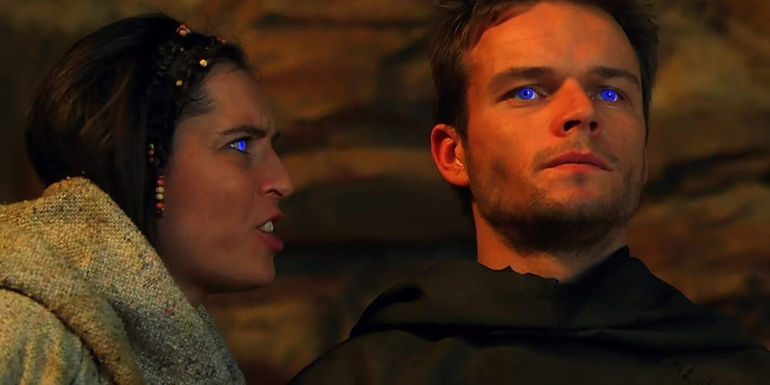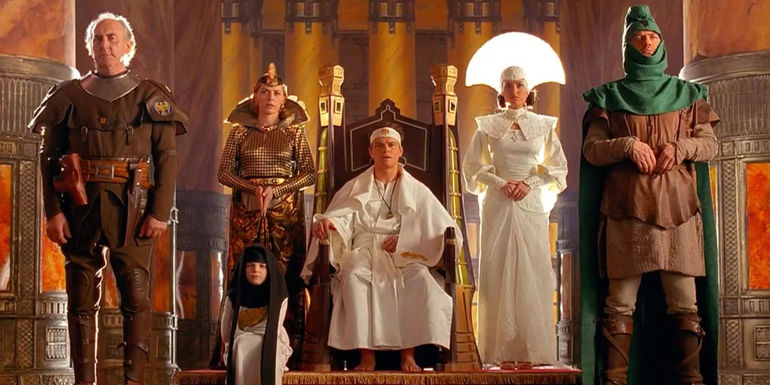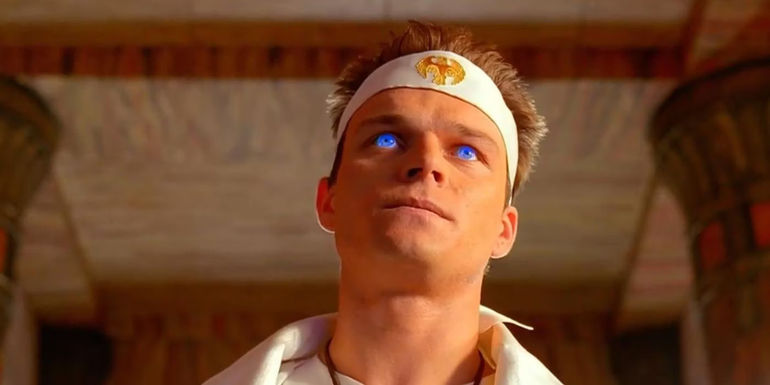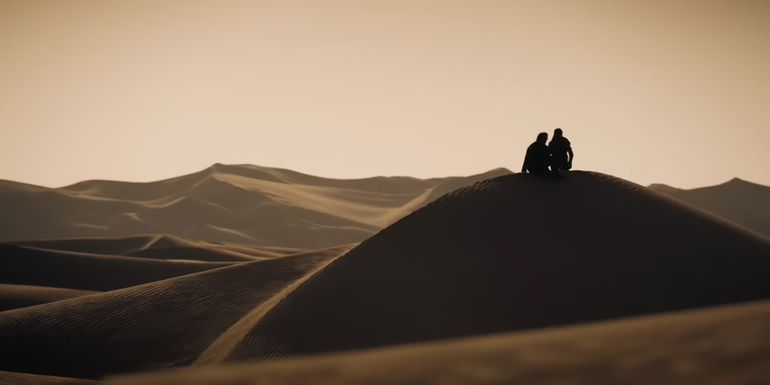
Dune: SyFy Miniseries vs Villeneuve's Dune Films

A comparison of the 2000 Dune miniseries and Denis Villeneuve's Dune films, exploring the fidelity to the source material and the immersive qualities of each adaptation.
SyFy's 2000 Dune Miniseries Is More Faithful To The Source Material
Over two decades later, one key element still gives the 2000 Dune miniseries a huge advantage over Denis Villeneuve's Dune films. Before Villeneuve set out to tackle Frank Herbert's 1965 sci-fi epic on the big screen, Dune was adapted into a divisive 1984 film, which was helmed by Twin Peaks' collaborators Kyle MacLachlan and David Lynch, as well as John Harrison's three-part 2000 miniseries starring Alec Newman as Paul Atreides. Broadcast on Syfy (Sci Fi Channel), Frank Herbert's Dune was popular enough to garner a 2003 sequel miniseries, Frank Herbert's Children of Dune. Like the miniseries, Villeneuve's two-film Dune adaptation takes its time with the story.
Alec Newman as Paul Atreides in the Dune miniseries
However, despite the films' slow-burn approach, Dune: Part One and Dune: Part Two still can't quite match some elements of the SyFy miniseries. As is the case with any fandom, Dune lovers can't seem to agree on which adaptation is the best. Some favor the immersive aesthetic of Villeneuve's world, while others prefer the miniseries' style. In recent years, even Lynch's disowned 1984 movie has become a cult classic. While Dune: Part Two still hasn't hit theaters, it's hard to imagine the sequel film besting some elements of the miniseries, especially considering the key difference that differentiates the two remarkable adaptations.
Cast of the 2000 Dune miniseries at Pauls throne
When it comes to faithfulness to the source material, SyFy's 2000 miniseries is painstakingly devout. It's clear that writer-director John Harrison knew Herbert's works inside and out. In many cases, dialogue is lifted directly from the book, and nothing exists without a novel-like explanation. One of the biggest criticisms leveraged against Lynch's adaptation was its confusing, hard-to-follow plot and lore, especially for Dune newbies. Unlike the 1984 film, the 2000 Dune miniseries explores every inch of the known universe. Moreover, Harrison used the benefit of a longer runtime — something most '80s films wouldn't have had — to his advantage.
Alec Newman as Paul is tested by the Bene Gesserit Reverend Mother in the Dune miniseries
According to Harrison, the changes that were made when translating Dune to the small screen were done with Herbert's intentions at the forefront. That is, if the source material had been vague about something, Harrison used canonical texts to elaborate. For example, the character of Princess Irulan (played by Florence Pugh in Dune 2) has a very small part in the first Dune book, but goes on to play a crucial role in Herbert's sequels. Instead of sidelining Irulan, Harrison wrote her a more substantial story, all while keeping her future plots in mind. Undoubtedly, Harrison's deep, unfaltering respect of (and love for) the source material shines through on screen.
Princess Irulan making a recording in the Dune 2 trailer
2000's Dune Was Able To Easily Adapt Other Frank Herbert Books
The SyFy series' extreme faithfulness to Herbert's novels and ability to capture the books' more cerebral elements certainly make it a well-loved entry in the Dune franchise. In fact, Harrison's devout approach, combined with the miniseries format, make it a clear favorite for many viewers. While the original novel, Dune, is often thought of as a standalone sci-fi epic, the first installment in Herbert's series doesn't capture the full scope of Paul's destiny, from Dune's Kwisatz Haderach role to the impact he has on the known universe. Herbert's second and third books, Dune Messiah and Children of Dune, necessarily complete the initial trilogy of Dune novels.
Alec Newman as Paul Atreides looks upset with melange eyes in the Dune miniseries
After assuming the role of Emperor at the end of Dune, Paul becomes the most powerful figure in the known universe. However, it's a destiny that his fatal, irrevocable consequences. In becoming the Fremen messiah, Paul sets into motion a bloody conquest, and Dune Messiah interrogates the not-so-heroic elements of Paul's decisions. Arguably, this exploration of the Chosen One narrative is one of the series' most compelling aspects. In 2003, Harrison adapted the second and third books into a sequel miniseries, Frank Herbert's Children of Dune. This allowed the writer to explore the full scope of Paul's story on screen, thus capturing the books' most essential elements.
Paul (Timothée Chalamet) stooping in front of Fremen in Dune Part Two
The Dune Miniseries' Fidelity Makes It Less Immersive Than Villeneuve's Epic Dune Films
While an unwavering fidelity to Herbert's beloved source material is generally a mark in the 'pro' column, extreme faithfulness also gets in the miniseries' way. Given the differences between the two storytelling mediums, there are just some scenes that play better on the page than they do on the screen. Even though Harrison made some changes, he didn't do enough to really leverage television's advantages as a medium. Moreover, sometimes less really is more. There are several plodding moments and unnecessary characters that take away from Dune's pacing. Although on-the-page narration inherently allows for more tangents and details, the miniseries could've benefited from being trimmed down.
Paul in battle with Feed-Rautha in Dune_ Part Two
Even though Dune: Part One is packed with exposition, it still feels more epic in scope. Not to mention, cutting things down to the most necessary moments, details, and characters allows the story to be all-the-more immersive. Keeping scenes for the sake of being faithful to the book doesn't actually serve Dune's narrative. Villeneuve's adaptations seem to be keeping that consideration in mind. The changes that are made service the fact that it's a two-part film, all while keeping Herbert's core story intact. Although it remains to be seen how Villeneuve will end Paul's story, it's clear that the immersive, thoughtfully plotted film saga has its advantages.
Rebecca Ferguson standing against a wall in Dune
Villeneuve Might Still Adapt Other Dune Books
Villeneuve has teased the possibility of a Dune: Part Three, though it's not clear if the filmmaker will get the chance to adapt other Dune novels to the big screen. Although Dune: Part One was a critical and commercial success, Dune: Part Two's performance may impact the franchise's future. Of course, making a trilogy of films — a third that adapts Dune Messiah and shows Paul's messianic fall, so to speak — feels like a natural fit. Without a Villeneuve adaptation of the end of Paul Atreides' story, SyFy's 2000 Dune miniseries, replete with its sequel, would have yet another advantage.
Paul and Chani in Dune 2






















